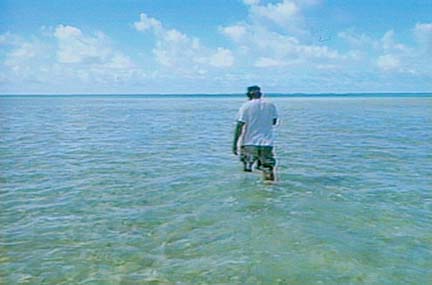


The greenhouse effect has come a long way. Just a few years ago it was merely a lowly theory embraced by many a rabid environmentalist but few mainstream scientists. Based on the idea that an ever-thickening layer of carbon dioxide was trapping more and more heat in the Earth's atmosphere, and that the world's overconsumption of fossil fuels was accelerating carbon dioxide emissions, the greenhouse effect offered a pristine explanation for the concomitant rise of both industrial production and global temperatures. Gas and coal emissions were increasing and the world was getting hotter. It was all very simple. That sinking feeling
Most of the world is being
By Scott Vogel
spared the effects of global
warming, because the ocean
is absorbing the heat, with
disastrous results for
Pacific nations
Star-BulletinAnd all very true, it turns out. Just this week, Science magazine published two important papers on global warming which provide the best evidence yet of a definite cause-effect relationship between the lifestyles of humans and the rise of temperatures on Earth. Previous research has focused on air temperature, which fluctuates greatly from day to day, and as such is not a reliable gradient for studying climatic change. The new studies, on the other hand, chart the rise in sea temperatures, and these are far more consistent over time.
Not only are ocean temperatures climbing, they are actually slowing down the warming of the rest of the human environment by absorbing most of the heat generated by the greenhouse effect.
In other words, the oceans are actually preventing the Earth from experiencing even more rapid temperature increases than they are, which is a kind of good news.

Unless of course you live in the Pacific Islands. Here, sea water levels and the increase in ocean temperature have combined to submerge whole islands, destroy coral reefs and jeopardize the lives of more than 7 million people scattered among the Pacific's many atolls. A sort of view from the front lines of global warming, Andrea Torrice's "Rising Waters: Global Warming and the Fate of the Pacific Islands," which airs Sunday night on KHET, is at its best when detailing the effects of this climatic phenomenon on real people.It's one thing to watch computer-generated models on nightly news segments. It's another to see cemeteries upended by rising waters, to see fishermen bringing in one-tenth of the 500 pounds of fish they used to catch in a night, to see houses and lives under siege. And not just livelihoods are threatened. The Pacific Islands, home to more than a thousand different languages and peoples, stand to experience cultural extinction in a major way. In the film, worried residents of Samoa, Fiji, Kiribati and the Marshall Islands offer emotional testimony of the havoc already wreaked by global warming, and these first-hand accounts are riveting.
"Rising Waters" might have been a better documentary, however, if Torrice had stuck to the human side of the story. In a scant 60 minutes there simply isn't time to explore the political machinations surrounding the various Climate Change Conferences that have been held around the world since 1992, and whose recommendations for lowering greenhouse gases have been laughably tentative.
An entire film could be made about the ostrich-like cowardice of the world's wealthiest nations on this issue, and of the hypocrisy of countries like the United States, which claims to feel the pain of Pacific Islanders even as it floats fears of a worldwide economic slowdown should limits in emissions be enacted.
The documentary also has a tendency toward digression. The U.S.'s detonation of 67 nuclear bombs on two of the Marshall Islands during World War II is a serious issue and an ongoing tragedy, but its relationship to the film's thesis -- that the bulk of global warming results from everyday polluting by average citizens -- is murky at best. And at times, Torrice seems to undermine her argument, as in another segment about the Marshall Islands. Ben Graham, the country's head of tourism, laments the environmental devastation that now requires his nation to spend more than the islands' annual budget on building and maintaining seawalls. Meanwhile, he's trying to diversify the Marshalese economy by encouraging eco-tourism, a measure that, despite its gentle-sounding name, cannot help but lead to corruption of flora and fauna.
But otherwise, Torrice's film is an extremely accessible, clearly-presented introduction to the consequences of global warming, and also to the international shell game that major countries are playing even as the Pacific's swallowing-up of islands has already begun. The sad impression with which we are left is that nothing will ever be done, at least until the effects of global warming have become even more pronounced. Of course, that won't be long, as Penehuro Lafale, a Samoan climatologist, reminds us near the end of "Rising Waters."
"We may be the first victims of this phenomenon," she tearfully confides to the camera, "but your turn will come up later, whether it be your children or your grandchildren, unless we do something about it."

"Rising Waters" will be followed at 7 p.m. by "May Earth Live: A Journey Through the Hawaiian Forest."
What: "Rising Waters: Global Warming and the Fate of the Pacific Islands" On TV
When: 6 p.m. Sunday on KHET/PBS
Click for online
calendars and events.